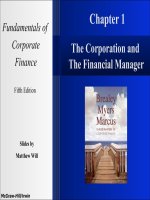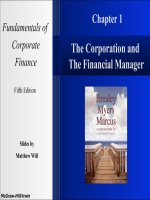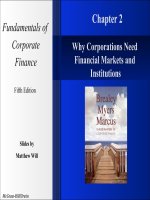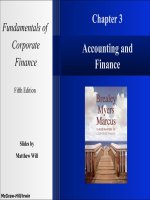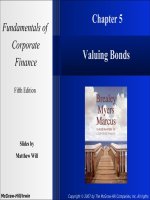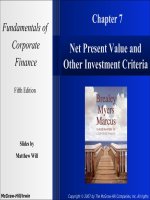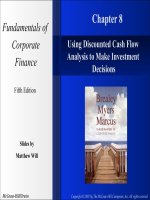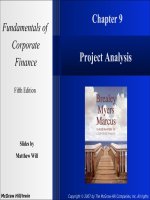Fundamentals of corporate finance 5e mcgraw chapter 015
Bạn đang xem bản rút gọn của tài liệu. Xem và tải ngay bản đầy đủ của tài liệu tại đây (564.57 KB, 22 trang )
Fundamentals of
Corporate
Finance
Chapter 15
Debt Policy
Fifth Edition
Slides by
Matthew Will
McGraw-Hill/Irwin
Copyright © 2007 by The McGraw-Hill Companies, Inc. All rights reserved
15- 2
Topics Covered
Debt and Value in a Tax Free Economy
Capital Structure and Corporate Taxes
Cost of Financial Distress
Explaining Financial Choices
McGraw-Hill/Irwin
Copyright © 2007 by The McGraw-Hill Companies, Inc. All rights reserved
15- 3
Value and Capital Structure
Assets
Value of cash flows from
firm’s real assets and
operations
Value of Firm
McGraw-Hill/Irwin
Liabilities and Stockholder’s Equity
Market value of debt
Market value of equity
Value of Firm
Copyright © 2007 by The McGraw-Hill Companies, Inc. All rights reserved
15- 4
Average Book Debt Ratios
McGraw-Hill/Irwin
Copyright © 2007 by The McGraw-Hill Companies, Inc. All rights reserved
15- 5
M&M (Debt Policy Doesn’t Matter)
Modigliani & Miller
When
there are no taxes and capital markets
function well, the market value of a company
does not depend on its capital structure. In other
words, financial managers cannot increase
value by changing the mix securities used to
finance the company.
McGraw-Hill/Irwin
Copyright © 2007 by The McGraw-Hill Companies, Inc. All rights reserved
15- 6
M&M (Debt Policy Doesn’t Matter)
Assumptions
By issuing 1 security rather than 2, company
diminishes investor choice. This does not reduce
value if:
Investors do not need choice, OR
There are sufficient alternative securities
Capital structure does not affect cash flows e.g...
No taxes
No bankruptcy costs
No effect on management incentives
McGraw-Hill/Irwin
Copyright © 2007 by The McGraw-Hill Companies, Inc. All rights reserved
15- 7
M&M (Debt Policy Doesn’t Matter)
Example - River Cruises - All Equity Financed
Data
Number of shares
100,000
Price per share
$10
Market Value of Shares $ 1 million
Outcome
State of the Economy
Slump
Expected
Boom
Operating Income
$75,000 125,000
175,000
Earnings per share
$.75
1.25
1.75
Return on shares
7.5%
12.5%
17.5%
McGraw-Hill/Irwin
Copyright © 2007 by The McGraw-Hill Companies, Inc. All rights reserved
15- 8
M&M (Debt Policy Doesn’t Matter)
Example
cont.
50% debt
Data
Number of shares
Price per share
Market Value of Shares
Market value of debt
Outcome
State of the Economy
Operating Income
Interest
Equity earnings
Earnings per share
Return on shares
McGraw-Hill/Irwin
50,000
$10
$ 500,000
$ 500,000
Slump
$75,000
$50,000
$25,000
$.50
5%
Expected
125,000
50,000
75,000
1.50
15%
Boom
175,000
50,000
125,000
2.50
25%
Copyright © 2007 by The McGraw-Hill Companies, Inc. All rights reserved
15- 9
M&M (Debt Policy Doesn’t Matter)
Example - River Cruises - All Equity Financed
- Debt replicated by investors
Outcome
State of the Economy
Earnings on two shares
LESS : Interest @ 10%
Net earnings on investment
Return on $10 investment
McGraw-Hill/Irwin
Slump Expected
Boom
$1.50
$1.00
$.50
5%
3.50
1.00
2.50
25%
2.50
1.00
1.50
15%
Copyright © 2007 by The McGraw-Hill Companies, Inc. All rights reserved
15- 10
M&M (Debt Policy Doesn’t Matter)
Example - River Cruises – Firm debt at 50%
- Investor can unwrap debt
Outcome
State of the Economy
Earnings on one share
Slump Expected Boom
$0.50 1.50
2.50
PLUS : Interest @ 10%
Net earnings on investment
Return on $10 investment
$1.00
$1.50
7.5%
McGraw-Hill/Irwin
1.00
2.50
12.5%
1.00
3.50
17.5%
Copyright © 2007 by The McGraw-Hill Companies, Inc. All rights reserved
15- 11
C.S. & Corporate Taxes
Operating Risk (business risk) – Risk in the firm’s
operating income.
Financial Risk - Risk to shareholders resulting from
the use of debt.
Financial Leverage - Increase in the variability of
shareholder returns that comes from the use of
debt.
Interest Tax Shield- Tax savings resulting from
deductibility of interest payments.
McGraw-Hill/Irwin
Copyright © 2007 by The McGraw-Hill Companies, Inc. All rights reserved
15- 12
Cost of Capital
requity = rassets
D
+ (rassets − rdebt )
E
D
E
WACC = (1 − Tc )rdebt
+ requity
D+E
D+E
McGraw-Hill/Irwin
Copyright © 2007 by The McGraw-Hill Companies, Inc. All rights reserved
15- 13
MM’s Proposition II (w/fixed interest rate)
r
rE
rA
rD
D
V
McGraw-Hill/Irwin
Copyright © 2007 by The McGraw-Hill Companies, Inc. All rights reserved
15- 14
MM’s Proposition II (w/risky debt)
r
rE
rA
rD
Risk free debt
Risky debt
Includes Bankruptcy Risk
McGraw-Hill/Irwin
D
V
Copyright © 2007 by The McGraw-Hill Companies, Inc. All rights reserved
15- 15
Weighted Average Cost of Capital
r
rE
WACC with no
bankruptcy risk
WACC
rD
D
V
McGraw-Hill/Irwin
Copyright © 2007 by The McGraw-Hill Companies, Inc. All rights reserved
15- 16
C.S. & Corporate Taxes
Example - You own all the equity of Space Babies
Diaper Co. The company has no debt. The
company’s annual cash flow is $10,000, before
interest and taxes. The corporate tax rate is 35%.
You have the option to exchange part of your
equity position for 6% bonds with a face value of
$50,000.
Should you do this and why?
McGraw-Hill/Irwin
Copyright © 2007 by The McGraw-Hill Companies, Inc. All rights reserved
15- 17
C.S. & Corporate Taxes
Example - You own all the equity of Space Babies Diaper Co. The company
has no debt. The company’s annual cash flow is $10,000, before interest
and taxes. The corporate tax rate is 35%. You have the option to
exchange part of your equity position for 6% bonds with a face value of
$50,000.
Should you do this and why?
EBIT
Interest Pmt
Pretax Income
Taxes @ 35%
Net Cash Flow
McGraw-Hill/Irwin
All Equity 1/2 Debt
10,000
10,000
0
3,000
10,000
7,000
3,500
2,450
6,500
4,550
Copyright © 2007 by The McGraw-Hill Companies, Inc. All rights reserved
15- 18
C.S. & Corporate Taxes
Example - You own all the equity of Space Babies Diaper Co. The company
has no debt. The company’s annual cash flow is $10,000, before interest
and taxes. The corporate tax rate is 35%. You have the option to
exchange part of your equity position for 6% bonds with a face value of
$50,000.
Should you do this and why?
EBIT
Interest Pmt
Pretax Income
Taxes @ 35%
Net Cash Flow
McGraw-Hill/Irwin
All Equity 1/2 Debt
10,000
10,000
0
3,000
10,000
7,000
3,500
2,450
6,500
4,550
Total Cash Flow
All Equity = 6,500
*1/2 Debt = 7,550
(4,550 + 3,000)
Copyright © 2007 by The McGraw-Hill Companies, Inc. All rights reserved
15- 19
Capital Structure
PV of Tax Shield =
(assume perpetuity)
D x rD x Tc
= D x Tc
rD
Example:
Tax benefit = 10,000 x (.06) x (.35) = $210
PV of 210 perpetuity = 210 / .06 = $3,500
PV Tax Shield = D x Tc = 10,000 x .35 = $3,500
McGraw-Hill/Irwin
Copyright © 2007 by The McGraw-Hill Companies, Inc. All rights reserved
15- 20
Financial Distress
Costs of Financial Distress - Costs arising from
bankruptcy or distorted business decisions before
bankruptcy.
Market Value =
McGraw-Hill/Irwin
Value if all Equity Financed
+ PV Tax Shield
- PV Costs of Financial Distress
Copyright © 2007 by The McGraw-Hill Companies, Inc. All rights reserved
15- 21
Financial Distress
Market Value of The Firm
Maximum value of firm
Costs of
financial distress
PV of interest
tax shields
Value of levered firm
Value of
unlevered
firm
Optimal amount
of debt
Debt
McGraw-Hill/Irwin
Copyright © 2007 by The McGraw-Hill Companies, Inc. All rights reserved
15- 22
Financial Choices
Trade-off Theory - Theory that capital structure is
based on a trade-off between tax savings and
distress costs of debt.
Pecking Order Theory - Theory stating that firms
prefer to issue debt rather than equity if internal
finance is insufficient.
Financial Slack
McGraw-Hill/Irwin
Copyright © 2007 by The McGraw-Hill Companies, Inc. All rights reserved
